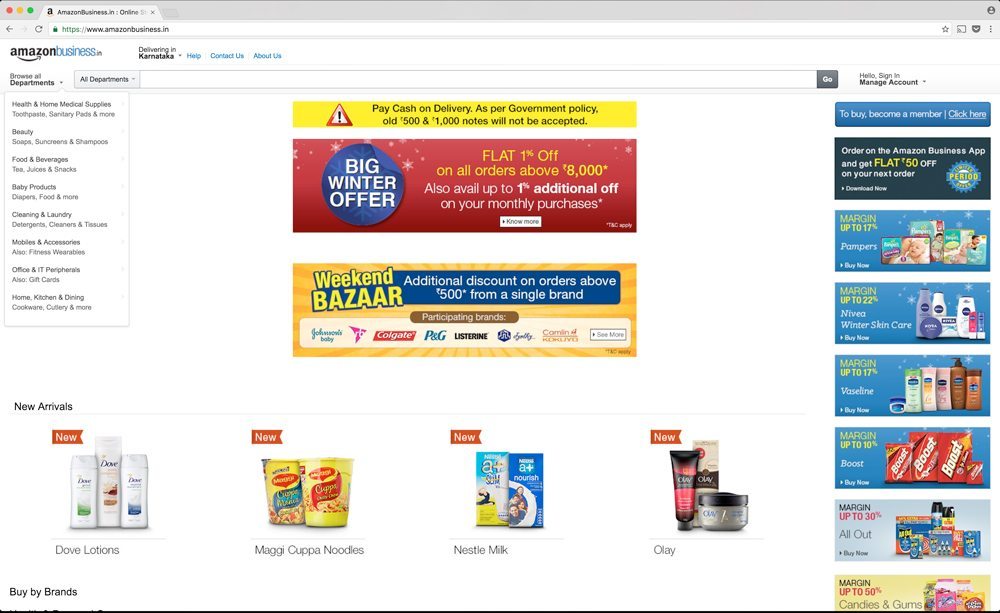Story Highlights
- The Government e-Market B2B platform looks promising and is unlike other government websites
- Moving government procurement online will increase transparency
- B2B e-commerce is to set to boom and can accelerate if the government pursues this move with the right intent
The Indian government’s plan to move all its purchases to an online marketplace model (à la Amazon) through direct purchases, bids and reverse auctions is fundamentally aimed at tackling corruption. However, one of the outcomes — perhaps intended — will be a definitive steer of B2B purchases online that could, in turn, kickstart a bigger online commerce revolution in the country.
To be sure, attempts like these in India haven’t been very successful (e-tendering for highway projects, for example) in the past. This is primarily because of lack of intent, poorly thought-through process, lack of experience, and weak enforcement and support. But, the sheer size of government purchases — estimated a fifth of India’s GDP — that could flow through the mega Government e-Market (GeM) could tip the scales this time.
The platform resembles marketplaces like Amazon or Flipkart rather than a standard ‘government website’. The interface is clean, self-explaining and super responsive
At least the early signs are encouraging. Let’s take a closer look at the GeM platform.
- The platform resembles marketplaces like Amazon or Flipkart rather than a standard “government website”. It has done away with legacy tendering systems and supports direct purchases, bids and reverse auctions (methods used globally in government procurement).
- The interface is clean, self-explaining and super responsive — a huge step from away government sites that looked like this.
- Registration is quick, straightforward and authenticated. Users have to register with their Aadhar number or a verified mobile number. This is a key step in ensuring transparency.
- Pilot runs since June 2016 have seen more than 100 bids / reverse auctions, the largest being the procurement of about 17,000 bank passbook update machines. These are minuscule numbers that provide no indication of scalability.
The billion rupee question, however, is will the government be able to implement it effectively? How does it plan to bring sellers online? How will it educate thousands of not-so-tech-savvy procurement officials? And many more.
Time for B2B e-commerce to shine
India’s retail infrastructure is built on a wholesale network that just about works. It is a fragmented and inefficient machine run by middlemen who exploit producers, build demand-supply asymmetry and inflate prices (sometimes more than 1,000% of the producer price).
Perhaps, due to these reasons, India’s B2B e-commerce (Rs 19 lakh crore in 2015) is set to grow to Rs 45 lakh crore by 2020.
India’s B2B e-commerce is set to grow to Rs 45 lakh crore by 2020. Any serious move by the government to bring its B2B purchases online will accelerate this movement
It’s a number that has gotten the two global e-commerce behemoths — Amazon and Alibaba — tussling for India’s B2B market. Amazon’s been investing steadily in its wholesale operation that it setup in 2013 (around Rs 155 crore by Sep 2016). Today, amazonbusiness.in (its B2B portal) caters to buyers from Delhi, Karnataka and Tamilnadu with some select items available in Telengana.
Alibaba has been around longer in a slightly different format — cross-border wholesale. In September, it signed up with Kotak Mahindra, IDFC bank and Aditya Birla Finance to provide banking and financial support for Indian SME exports. It is very likely that Alibaba will also bring about a stronger domestic B2B play soon.

Local players like IndiaMART and several startups have also been scrambling for an early share of this pie.
Private funding too has been on the rise. In 2016, B2B startups raised $85 million in funding compared to $21 million the year before.
Any serious move by the government to bring its B2B purchases online will accelerate this movement.
As thousands of producers and wholesalers onboard onto a digital platform, we are likely to see offshoot benefits rise, including greater comfort and adoption of digital payments, more transparency in pricing, reach and competitiveness, and, in turn, greater investments in this space. We are also likely to see storage, logistics and transportation solutions focussed on the B2B develop more aggressively.
Subscribe to FactorDaily
Our daily brief keeps thousands of readers ahead of the curve. More signals, less noise.
To get more stories like this on email, click here and subscribe to our daily brief.
Disclosure: FactorDaily is owned by SourceCode Media, which counts Accel Partners, Blume Ventures and Vijay Shekhar Sharma among its investors. Accel Partners is an early investor in Flipkart. Vijay Shekhar Sharma is the founder of Paytm. None of FactorDaily’s investors have any influence on its reporting about India’s technology and startup ecosystem.








